Run a free Kane County warrant search quickly and without hassle using this streamlined resource. You may perform a warrant search without any fees by utilizing online databases maintained by local record custodians.
Custodians of warrants are typically courts or law enforcement agencies; since each custodian may generate warrants for different reasons, this resource explains the various types of warrants that may be issued, what they mean, and how to view or request warrant details via each office or search tool.
Find out if you or someone you know has a warrant in Kane County, Illinois, today.
Information Necessary for Conducting a Free Kane County Warrant Search
The state of Illinois has an open records law. Under Illinois Compiled Statutes 5-140-1, everyone is entitled to information regarding the official acts of the public officials and employees that represent them.1 Illinois has enacted a general policy that government offices should be transparent. In keeping with that policy, government offices are obligated to provide public records upon request.
Public records include reports, writings, and memoranda prepared by or under the control of a government office. A warrant is a legal written order generated by an Illinois court or law enforcement agency to arrest a person or search for a thing.
There are some exemptions to the public records law contained within the same statute. Section 5-140-7(d) is most relevant concerning warrants.
It provides that requests for public records are exempt from disclosure to the extent that it would reasonably interfere with law enforcement and administrative enforcement proceedings, obstruct an ongoing criminal investigation, deprive a person of a fair trial, disclose specialized investigative techniques, and reveal the identity of a confidential source.
If a warrant contains exempt information, a government body may elect to redact that information and make the remainder of the document available for inspection and copying upon request.
Generally, an arrest warrant is only made available to the public after it has been executed. The charges alleged on the warrant will be revealed in the subsequent criminal court case, and sometimes on a jail roster. An arrest warrant may also be made available before it is executed in the form of a wanted list.
The nature of search warrants is that they are strictly used in the process of an ongoing criminal investigation. Disclosing the contents of a search warrant to the public before it is executed may foreseeably cause a suspect to destroy or conceal the subject of the search warrant.
It is unlikely that a search warrant would ever be disclosed to the public before it is executed as doing so would reasonably obstruct the ongoing investigation.
When performing a warrant search you should know some basic information first. You should know the person’s first and last name, in addition to the county where the person lives or where the warrant was issued. If you know the date of birth or the date when the warrant was served it will help you narrow your search.
Warrants and the information they contain are maintained by federal, state, county, and municipal courts and law enforcement agencies. After a warrant has been executed the information they contain is generally made public. After the conclusion of a criminal case, unless sealed, the file is open to the public.
Many different types of warrants will be covered in subsequent sections. However, generally, warrants are generated for arrests and searches. Learn about them below.
How To Tell if Someone Has a Warrant in Kane County Illinois
As mentioned previously, warrants are generated by courts or law enforcement agencies and are always executed or served by a law enforcement officer. Arrest warrants are served on a person because an investigation shows there is probable cause to believe the person being arrested committed a crime. After the arrest warrant is served, a criminal case is created and sent to the courts.
All Felony and some misdemeanor criminal cases are heard in the Kane County Circuit Court of Illinois 16th Judicial Circuit.2
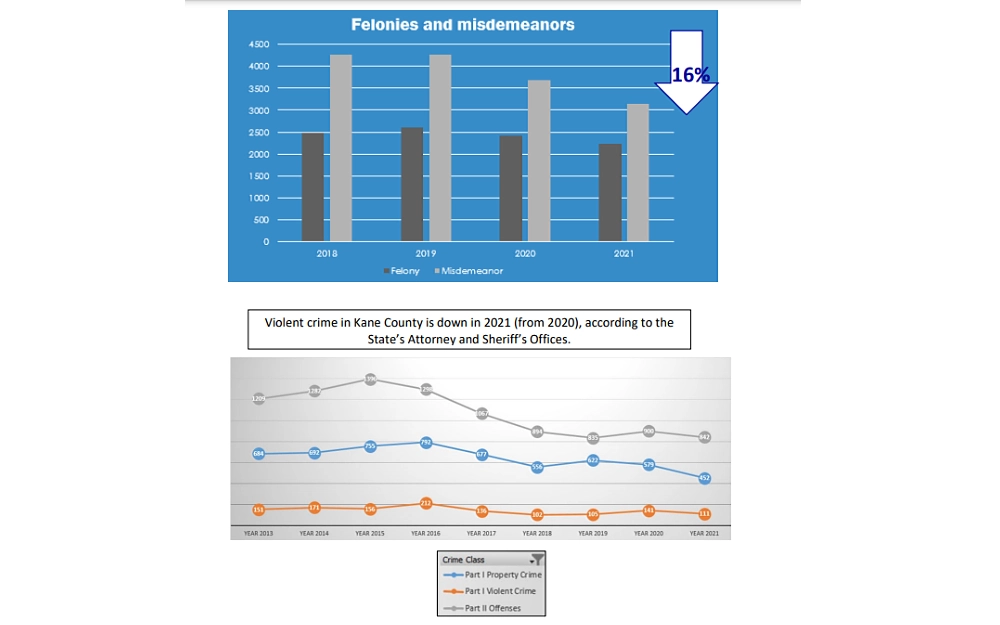
The records custodian for criminal case files is the Kane County Circuit Clerk. The case file will contain the arrest warrant that led to the criminal case.
If the court has issued a warrant for your arrest for missing a court date, you must visit the clerk’s office and review the court file.
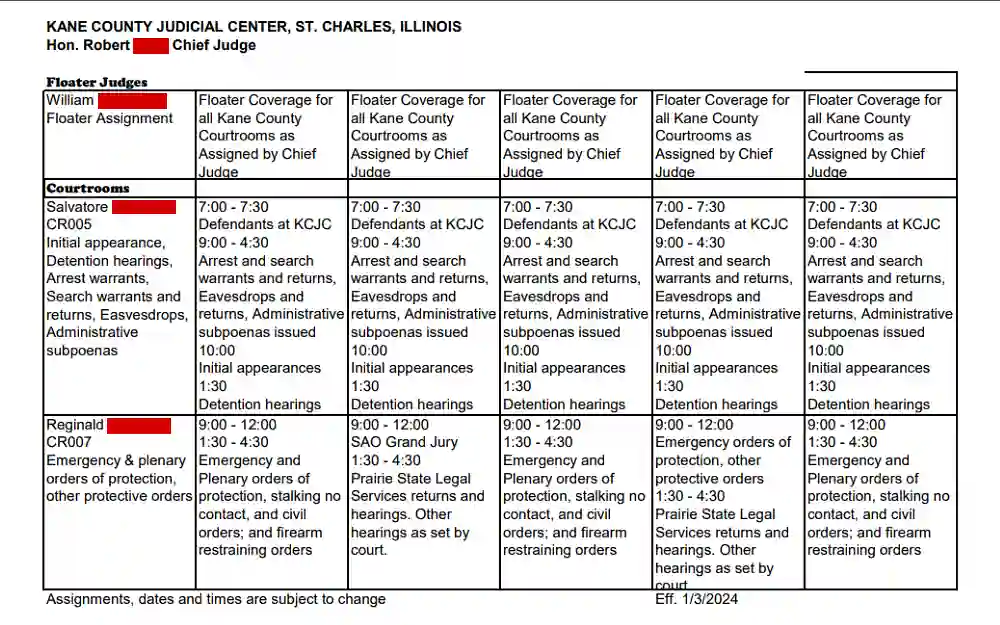
You may be able to have the warrant quashed, or removed, by filing a motion. An attorney would be able to assist.
If you are looking for general information about a criminal case to learn the charges, Kerr County Circuit Court has a Smart Search function.5 This search tool is free and allows anyone to look up criminal case file information online.
This is a name-based search, and you can narrow the results to criminal cases by selecting ‘Advanced Filtering Options’ and navigating to ‘Case Search Criteria’ then ‘Filter by Case Type’. Select ‘Criminal’.
You must enter ‘last name[comma][space]first name’. Results are limited to 200 cases per search.
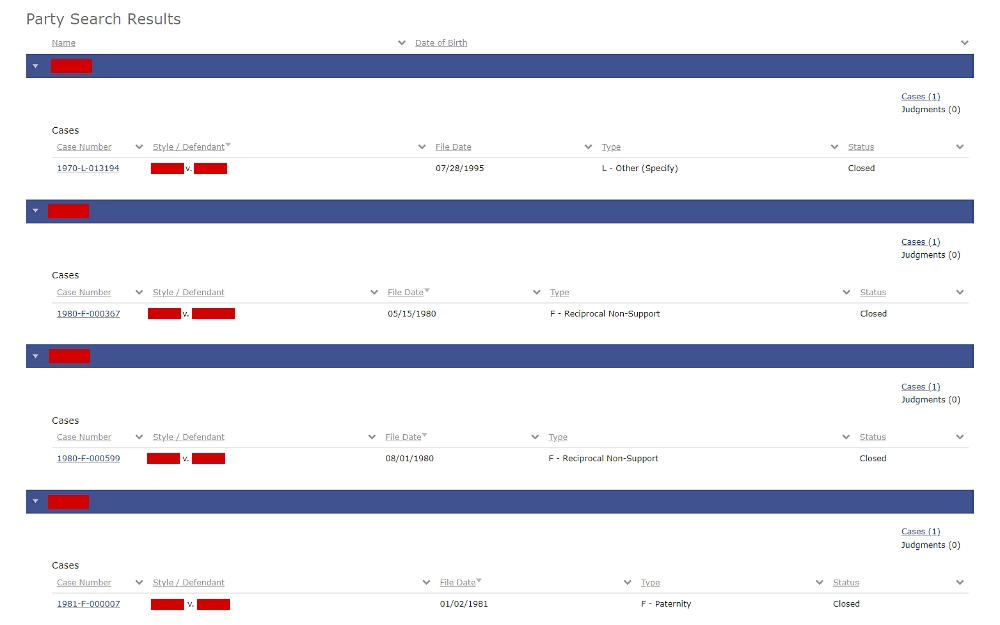
You can narrow the results by entering a date period when the case was created, or by entering a person’s middle name or date of birth.
When you find the right case in the results, click on the case number to discover more information. Under the ‘Charge’ heading you can see what the offenses were that led to an arrest and subsequent criminal case.
Members of the public may also submit a Freedom of Information Act request to view open court records that are not exempt per Illinois statute. Requests may be emailed or made in person. To view a criminal case file in person you can visit the Clerk of the Circuit Court’s office between the hours of 8:30 a.m. and 4:30 p.m. during weekdays.
Kane County Circuit Clerk
540 S. Randall Rd.
St. Charles, IL 60174
Phone: 630.232.3413
Email: [email protected]
The Warrants Division of the Kane County Sheriff’s Office oversees the execution and service for the court.6 The office also executes and serves arrest warrants during the normal course of law enforcement duties. You may inquire about warrants by contacting a member of the Warrant’s Division.
Kane County Sheriff’s Office
Warrants Division
37W755 Illinois Route 38
St. Charles, IL 60175
Phone: 630.208.2015
Alt: 630.208.2010
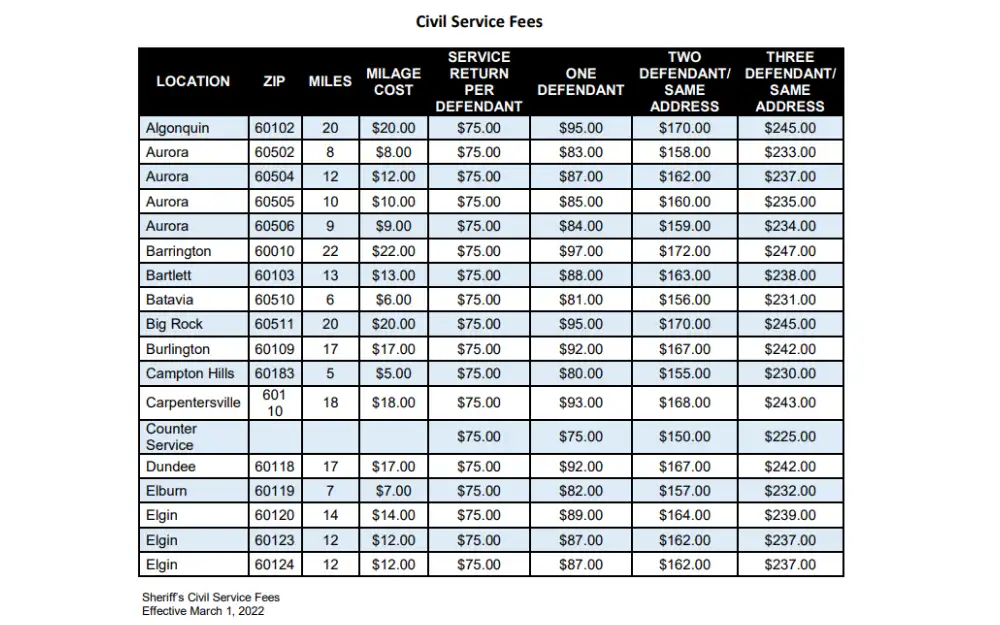
Municipalities also issue warrants. From municipal courts to city police departments. In Kane County, the City of Elgin Police Department executes warrants on its own behalf and the Municipal Court.
The police department posts an Elgin’s Wanted Persons & Information Sought page that displays photographs of suspects with active arrest warrants.8 If found, these individuals will be arrested and formally charged with committing a crime. You can click on a photograph to learn who the person is and what they are being accused of doing.
The Elgin Police Department warns against making contact with these individuals. If you see one of the people on the list, the department advises you to contact the police department when safe to do so.
Elgin Police Department
151 Douglas Ave.
Elgin, Illinois 60120
Phone: 847.289.2700
The City of St. Charles Police Department located in Kane County has a Police Records Division. The division is responsible for warrants and mentions it handles requests for public information. The St. Charles Freedom of Information Act Request is available for those looking for warrant information.9
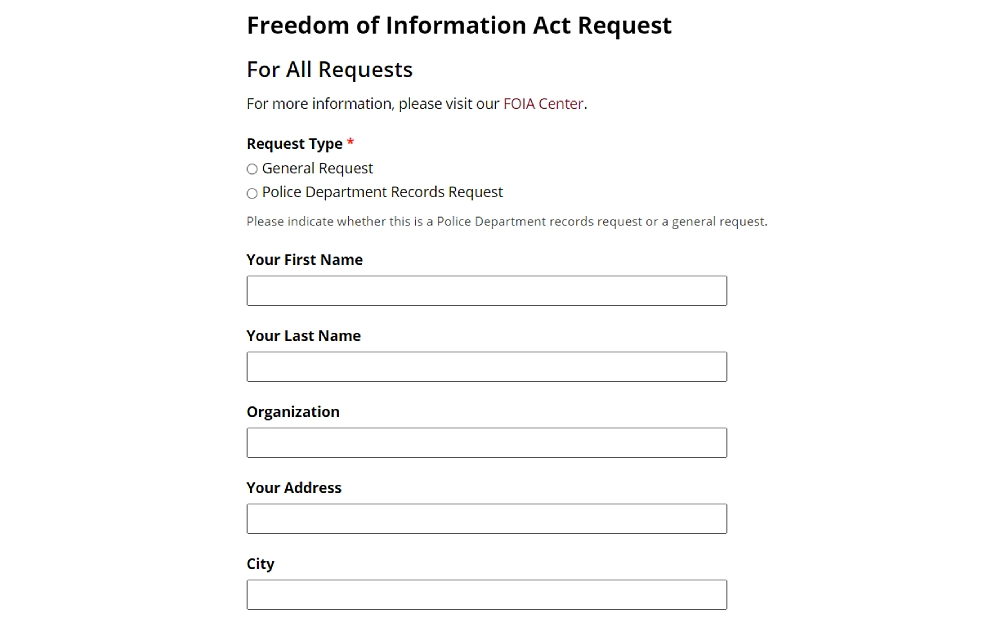
Be sure to select ‘Police Department Records Request’ and adequately describe that you are seeking to obtain warrant records. It is unclear if the police department will provide you with warrant details for someone else’s arrest and what any potential fees would be for receiving records. Contact the St. Charles Police Department for more information.
City of St. Charles Police Department
1515 West Main St.
St. Charles, Illinois 60174
Phone: 630.377.4435
Email: [email protected]
Fax: 630.377.1078
A Look at Warrant Types & Their Meanings
There are many different names for warrants but they mostly mean the same thing. Either a warrant is issued for a person’s arrest or a search for some specific thing.
Arrest Warrants: A complaint examined by a court that charges a person with committing a crime. It must include the alleged offense, the date and time it took place, name the accused person, and be signed by a judge.
Bench Warrants: Type of arrest warrant issued by the court when a person listed on a summons fails to appear at their listed court date.
Probation & Parole Violation Warrants: A person released from prison on parole must comply with all conditions and restrictions placed upon them by the prison review board. If the person is found to violate a condition a warrant will be issued for their arrest.
Traffic Warrants: A driving citation issued to a driver who violates a rule of the road. Some violations are serious enough for an arrest.
Child Support Warrants: Issued by a family court judge to arrest a parent who has not paid court ordered child support. The person will be prosecuted.
Capias & Capias Pro Fine Warrants: Issued when a person fails to pay a fine in a criminal case. Illinois requires a person to be given adequate time to make payment before being imprisoned.
Fugitive Warrants: Usually reserved for people on most wanted lists. They are created when a person charged with a serious or violent crime has evaded service or escaped confinement.
Search Warrants: A sworn legal document giving a law enforcement officer the authority to search a person, place, or thing for evidence.
How To Handle Outstanding Warrants in Kane County
It can be a troubling experience to find out you or someone you know has an outstanding warrant for your arrest. However, you have options when you learn about the warrant.
If the warrant is for someone you know, you could inform them if you deem it safe to do so. Some people may not want anyone to know about their warrant, especially if they are a fugitive. You may contact your local police department in this situation.10
If the warrant is for your arrest, you should respond accordingly based on the severity of the charge. If it is for not paying a misdemeanor fine, a court will likely allow you to pay the fine without any further consequence. If it is for a more serious offense, you should probably speak with a criminal defense attorney.
They can help you manage your affairs with your family, and arrange for you to possibly get a bond which will allow you to remain outside of confinement until your case is resolved.
Learning how to conduct a Kane County warrant search may prove to be beneficial in some situations; you never know when it may come in handy, but if it does, the guidance in this resource empowers you to handle matters seamlessly.
References
1Illinois General Assembly. (n.d). Illinois Compiled Statutes. Retrieved January 23, 2024, from <https://www.ilga.gov/legislation/ilcs/ilcs3.asp?ActID=85>
2Illinois 16th Judicial Circuit. (n.d). About. Retrieved January 23, 2024, from <https://www.illinois16thjudicialcircuit.org/Pages/About.aspx>
3Illinois 16th Judicial Circuit. (2022, July 08). Justice System Strategic Plan. Retrieved January 23, 2024, from <https://www.illinois16thjudicialcircuit.org/Documents/Justice%20System%20Strategic%20Plan.pdf>
4Illinois 16th Judicial Circuit. (2024, January 03). Court Schedules. Retrieved January 23, 2024, from <https://www.illinois16thjudicialcircuit.org/Documents/courtSchedules.pdf>
5Kane County Circuit Clerk. (n.d). Smart Search. Retrieved January 23, 2024, from <https://kanecoportal.co.kane.il.us/Portal/Home/Dashboard/29>
6Kane County Sheriff’s Office. (n.d). Civil Warrants Division. Retrieved January 23, 2024, from <https://www.kanesheriff.com/Pages/Civil-Warrants-Division.aspx>
7Kane County Sheriff’s Office. (2022, March 01). Civil Service Fees. Retrieved January 23, 2024, from <https://www.kanesheriff.com/Documents/Civil%20Warrants/Sheriffs%20Civil%20Service%20Fees%20and%20Other%20as%20of%203.1.2022.pdf>
8Elgin City. (n.d). Elgin’s Wanted Persons and Information Sought. Retrieved January 23, 2024, from <https://www.cityofelgin.org/PhotoGallery/Album/13>
9St. Charles City. (n.d). Freedom of Information Act Request. Retrieved January 23, 2024, from <https://www.stcharlesil.gov/foia-request>
10Kane County State’s Attorney’s Office. (n.d). Local Police Links. Retrieved January 23, 2024, from <https://sao.kanecountyil.gov/Pages/Links.aspx>
